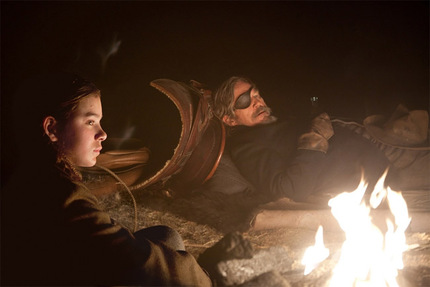Review: TRUE GRIT

Here you have Mattie Ross (Hailee Steinfeld), a 14 year old girl, with the gift of language and precociousness that serves her well on her quest to bring her father's killer, no-account low-life Tom Chaney to justice (or retribution.) It is telling that she goes after hiring trigger-happy Marshall, Rooster Cogburn (Jeff Bridges at his most grizzled) over the advice of a local on a more by-the-book bounty hunter (having met neither these men at this point, never meeting the latter at all.) She wants someone that can get things done, and if a few people get shot along the way, so be it, that's life on the frontier. Things get complicated when another competing bounty hunter, a Texas Ranger (Matt Damon), is also looking for Chaney, to bring him back to Texas. Mattie insists on accompanying these two men to see that her interests are maintained in the matter, even if they are at odds with the Rangers. Being the feisty and a very much hands on type, who can sell horses to a veteran horse-trader and then buy them back in the next sentence at a fraction of the price (a nice Coen commentary on the nature of our American Capitalism and self-interested rationalization), she ends up joining them despite their trying to brush her off.
Thus three completely different people, who despite all speaking English, more or less speak three different languages, set out into Indian country to make the no-account accountable and learn a few things about themselves along the way. The films most amusing scene (for me anyway) is set in a cabin in the middle of nowhere and finds the trio debating the finer points of Latin as a come-down after some up-close and personal violence. Using dialogue lifted directly from Charles Portis novel (also used in the previous John Wayne starring adaptation from 1969), one can see the attraction of the material to these particular directors. They craft the film with impeccable cinematography from Roger Deakins, and layer in a winning, quite traditional piano score. There is a smidgen of their deadpan sense of humour (evidence being the lengthy and hilarious court-room cross-examination of Cogburn in which his casual violence and justification for it is played for dry laughs.) Much like their previous film with Jeff Bridges, The Big Lebowski, there is the idea of turning a goof and layabout into a 'Man' that gets things done, without dropping his essential goofiness or layaboutness (witness Cogburn and Ranger LaBeouf shooting their foodstuffs in a contest while they are trekking about in the wilderness in winter with not a lot of food around.) Not to mention the villains in the piece are either brutally clueless (Josh Brolin essays the wounded, menacing brute to a tee) or in the case of Lucky Ned, not really having a beef other than that they have came into unforeseen proximity of the trio while employing Tom. Barry Pepper's full on transformation into Harry Dean Stanton is certainly a sight to be seen. But when there is a race-with-the-devil ride for medical attention, it is played like a straight-up act of heroism, and it plays very, very well. Funny that the Coens then undercut that 'moment of triumph' with another trope of the Western, the decline of the frontier, which is shown here as an epilogue that feels more like the traditional Coen tone than the rest of the film. I guess they just could not resist mythologizing American and then taking a little bit of the piss out of the place too. That is what they do best.

Do you feel this content is inappropriate or infringes upon your rights? Click here to report it, or see our DMCA policy.






